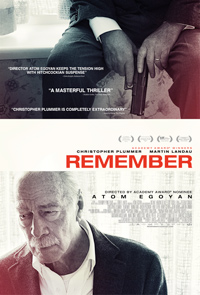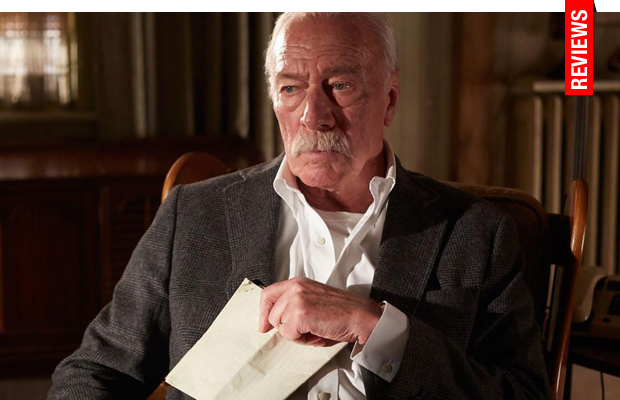Reviews
Remember | Review
Where the Truth Lies: Egoyan’s Pensive, Inconsistent Revenge Thriller
 Even despite its ironically forgettable title and considerable narrative flaws, Remember, the latest effort from Canadian auteur Atom Egoyan, is one of the filmmaker’s better offerings in recent memory (at least compared to the convoluted The Captive and wholly unnecessary Devil’s Knot). But his latest, penned by first time screenwriter Benjamin August, squanders its sidewinding road to viciousness with a ludicrous last minute twist calling into question too many sloppy plot holes which unfurled before it. A chance for a handful of prominent aging actors to be front and center doesn’t quite remove a fecund aura of exploitation, however, and there’s something inescapably pulpy about the increasingly irrational narrative which makes the film seem like the Holocaust survivor’s version of Nicholas Sparks’ The Notebook.
Even despite its ironically forgettable title and considerable narrative flaws, Remember, the latest effort from Canadian auteur Atom Egoyan, is one of the filmmaker’s better offerings in recent memory (at least compared to the convoluted The Captive and wholly unnecessary Devil’s Knot). But his latest, penned by first time screenwriter Benjamin August, squanders its sidewinding road to viciousness with a ludicrous last minute twist calling into question too many sloppy plot holes which unfurled before it. A chance for a handful of prominent aging actors to be front and center doesn’t quite remove a fecund aura of exploitation, however, and there’s something inescapably pulpy about the increasingly irrational narrative which makes the film seem like the Holocaust survivor’s version of Nicholas Sparks’ The Notebook.
Following the death of his wife, widower Zev Guttman (Christopher Plummer) is goaded to fulfill a complicated scheme he’s concocted with friend Max Zucker (Martin Landau), who resides in the same nursing home. Suffering from Alzheimer’s, Zev’s time is quickly running out, but he takes a highly detailed letter written by Max as he disappears from the home to find the Auschwitz prison guard responsible for murdering his family nearly sixty years prior. His target is now living under the assumed identity Rudy Kurlander, and Zev visits four possible suspects to determine which one is responsible and relieve his decades-long wrath. But Zev makes some startling surprises on his way to obtaining vengeance.
Despite several hard to swallow bits, including Egoyan’s signature flourishes of precocious children and/or willowy young women articulating bits of perniciously stagey dialogue, Remember is sometimes persuasively good, particularly for a fantastic lead performance from Christopher Plummer. The Oscar winning thespian is well cast, especially considering his filmography straddling both sides of the Nazi menace (The Sound of Music; Inside Man), but the prominent casting of Martin Landau, in what often seems a surprisingly throwaway turn, actually assists in neutering the film’s grand bombshell. A brief stop off with Bruno Ganz (otherwise wasted) as the first suspected SS leader also strengthens the film’s resemblance to Wim Wenders’ early road films with a Hitchcockian dash of identity crisis.
Heinz Lieven plays the second target, but ends up being a gay Jewish man on his deathbed (oddly, Lieven was also in another problematic Nazi-hunting film, Paolo Sorrentino’s 2011 film, This Must Be the Place), while the fourth and last Rudy Kurlander is none other than the villainous Jurgen Prochnow (another actor in his fair share of WWII themed titles). As Plummer’s pained, somewhat aggravated son, Henry Czerny is on hand to show mild concern.
To those with a cynical outlook, Remember feels unforgivably maudlin—nearly every unrelated supporting character seems ripped from the cliché rack of good or bad constitution, with “Breaking Bad” actor Dean Norris inhabiting a cartoonish second generation Nazi (whose modern equivalent is an officer of the law) in a sequence with chilling potential (such as Plummer’s anxiety at his ferocious, barking dog). The continual return to Landau’s detailed letter might also recall Christopher Nolan’s now seminal narrative mindfuck, Memento (2000), but Egoyan’s methodical approach sometimes seems maddeningly trite, honing in on Plummer’s Zev to create a compromised psychological portrait, only to be completely undone by its unnecessary twist (even then, what could’ve have a deliberately morbid ending is also ruined by a final explanation sequence just to make sure no one misunderstands anything obvious).
The film’s mawkish tendencies create an uneasy pallor of insensitivity concerning its subjects, kind of like the melodramatically unsound adaptation of Sarah’s Key (2010). Still, there’s enough to salvage here, and Remember recalls those juicy film noir era titles which were directly informed by WWII atrocities, like Robert Wise’s The House of Telegraph Hill (1951) or J. Lee Thompson’s Return from the Ashes (1965).
★★½/☆☆☆☆☆
Los Angeles based Nicholas Bell is IONCINEMA.com's Chief Film Critic and covers film festivals such as Sundance, Berlin, Cannes and TIFF. He is part of the critic groups on Rotten Tomatoes, The Los Angeles Film Critics Association (LAFCA), the Online Film Critics Society (OFCS) and GALECA. His top 3 for 2021: France (Bruno Dumont), Passing (Rebecca Hall) and Nightmare Alley (Guillermo Del Toro). He was a jury member at the 2019 Cleveland International Film Festival.






















